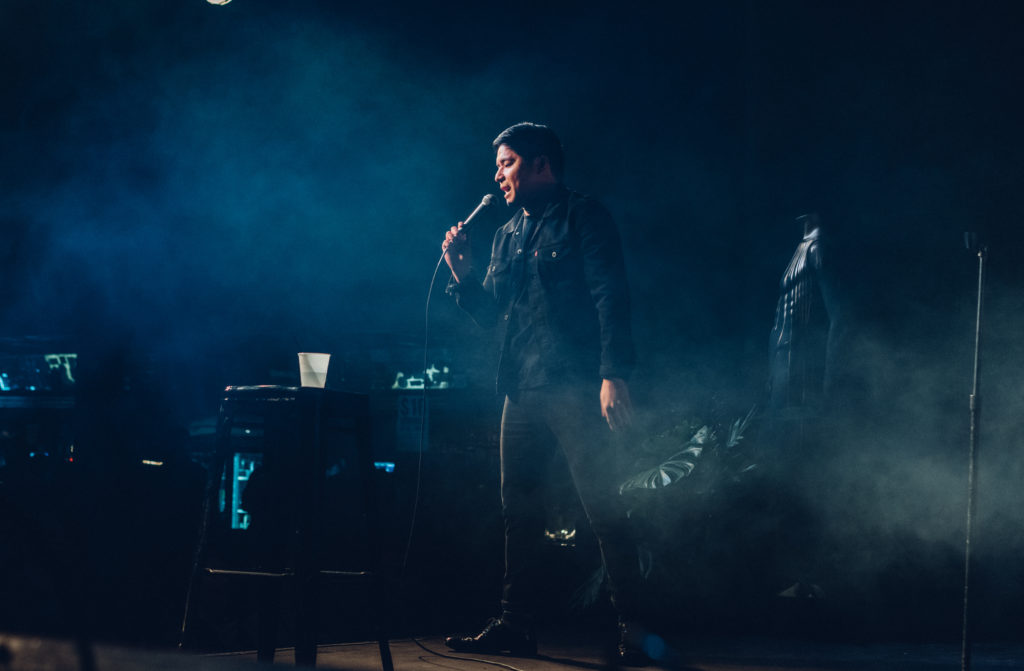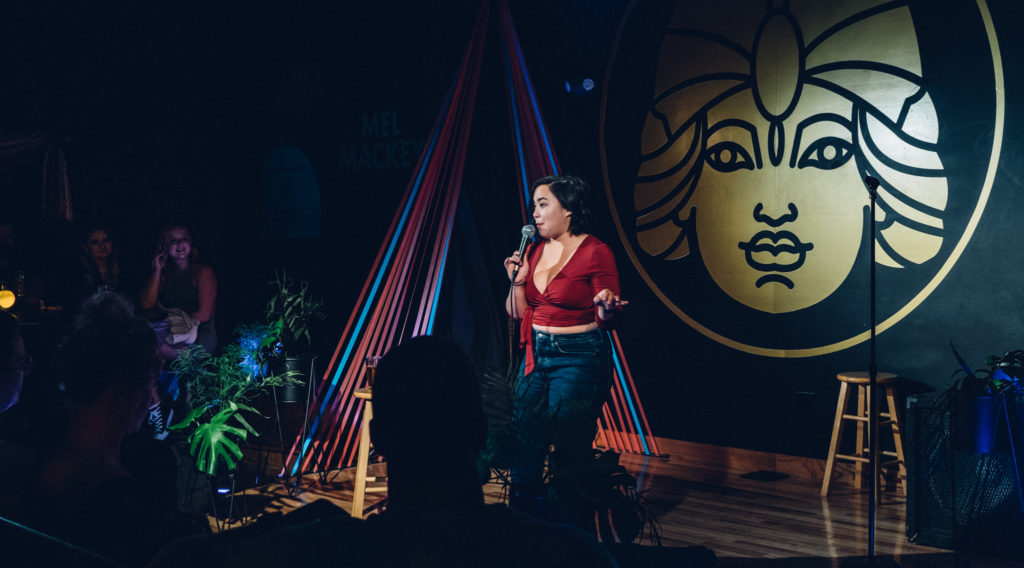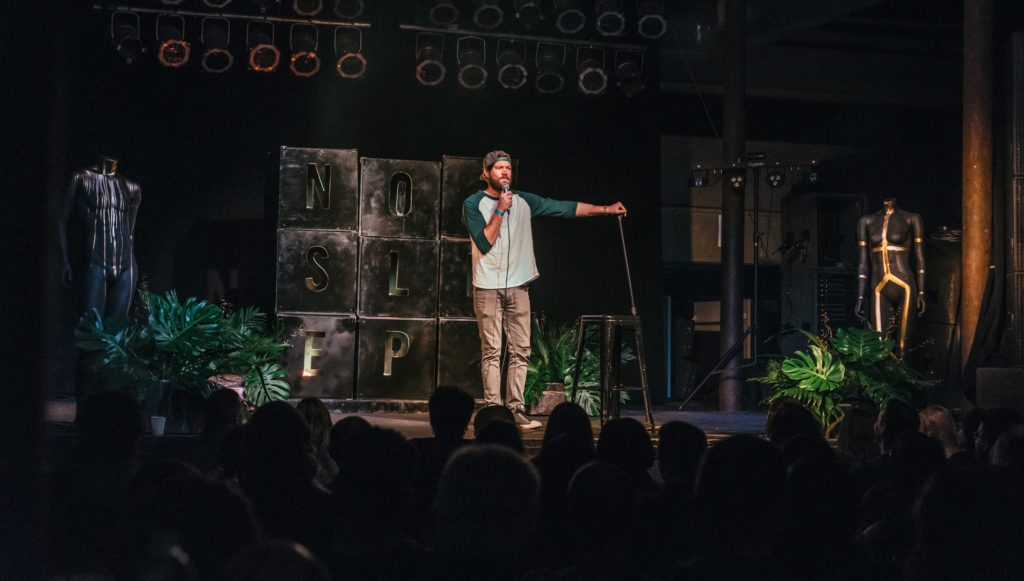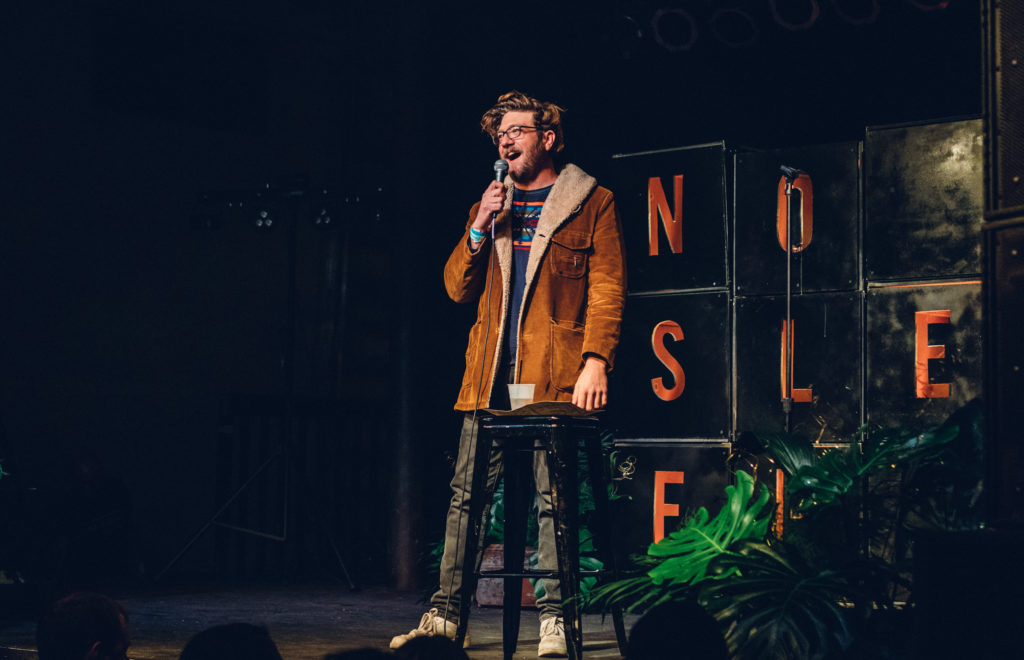I don’t want to hear about your local comedy scene. Honestly, it just doesn’t compare. You don’t have people who scrape ice off of their cars and slide out in brown slush just to try out five minutes of new material. If you’re talking about Chicago, it’s expected. When you’re talking about Des Moines, Iowa, it’s insane. For the last 14 years, there has been an enclave of huggable freaks, pukers of truth and go-getters who have made the Des Moines comedy scene the greatest in the country.
Around 2007, you would have been lucky to find an open mic, any open mic, happening around there. Des Moines was kind of a dead town. If you did happen to find one, it was usually littered with acoustic guitar music, rancid, amateur beat poetry, and the occasional bit of comedy. When you did find that comedy, it was likely to be in the style of the OG bro comic, who was usually talking about his dick on stage. If you wanted to see indie folks like Todd Barry perform, you had to drive over state lines to Omaha, Nebraska, when they came through.
It is impossible to tell the history of organized comedy in Des Moines without Dan Umthun. In 2008, the genial, beady-eyed saint of the historic East Village neighborhood founded a production banner called Underground Comedy, with an average open mic that brought out eight to 12 comedians, depending on the night. “Dan has been instrumental in producing and promoting shows to get a cohesive, inclusive scene going,” says Alex Carter, Umthun’s comedy partner of over 10 years. “He cares really deeply and it shows.”
That first generation of indie comics in the DSM spent years lugging a handmade stage platform up and down the basement stairs of the Beechwood Lounge. The show, lovingly dubbed “The Bomb Shelter,” has packed audiences into folding chairs between posts that have been holding up the building for over a decade. During summer shows, heat from the laughter and drunken energy lead to condensation sweating down the walls.
Many from that core Bomb Shelter group have either cemented themselves as pillars of the local scene or gone on to entrench themselves in other communities, from Patrick Hastie in Brooklyn, to AJ Grill in Milwaukee, to Andrew Lopez in Los Angeles.
Lopez, calling in from a weekend gig at the Comedy Works in Denver, remembers those days fondly. “We were doing alt shows like what you’d find in New York. There was something punk rock about it.”
Lopez made the jump to L.A. around a decade ago and has come a long way from the basement of the Beechwood: he has a series in development at FX called Iowa, which he calls “an ode to small town America,” and is currently writing both an upcoming streamer and a rom-com feature for Amazon Studios. The man is a tornado from a tornado state.

Bridging the corn belt
As the Underground Comedy foundation took root, their shows with national headliners transformed crusty hard rock venues into full-on comedy meccas for a night. Over the last 10 years, the DSM scene has snagged indie comedy giants like James Adomian, Pete Holmes, Matt Braunger, Kyle Kinane, and David Gborie, with shows opened by native heavies Sam Hirchak, Dante Powell, and Toll McGrane.
“Toll was great. I remember being impressed with the overall quality of the comedy there,” says Kyle Kinane, an Adult Swim and Comedy Central regular who has come through Des Moines many times. “The guys in the shows were concerned with being a good comic, and not just imitating other comics and kinda following in their cadence. That’s not always the case with some places.”
One of Kinane’s early stop-offs at House of Bricks turned an otherwise average downtown weeknight into street justice. “After the show, I was sitting near a window having a drink. Outside on the sidewalk, I saw a guy and this girl having words. Then his hands go up and he grabs her by the neck and slams her to the ground. I saw another comic and we shared this ‘did that really happen?’ look and we immediately went outside and chased the guy.”
The perp ran down the street to another bar, where Kinane helped a bouncer detain him until the cops arrived. “At this point, there’s a crowd, the bouncer’s got this guy on the ground and he yells, ‘Citizen’s arrest!’ I’d never heard that in my life.”
The Kinane incident has since become legend, a cornerstone of the Des Moines comedy mythos that is embellished and passed down to new members of their sect in the wee hours when the empties stack up and the tales grow taller.
Kinane would later come back to perform at another rock bar called Vaudeville Mews with up-and-comer Sam Tallent in tow.
“Mews was fun,” Tallent says. “They didn’t have chairs, so it was all these mid-30s punk rockers standing on concrete for the entire night.”
Tallent is the author of Running the Light, a breakout 2020 novel that details the glorious chaos of being a professional road comic. “Their bathroom door didn’t lock. I had to take a dump so I asked this host Donny to watch the door for me. He says no problem, so I go in and drop trou. As soon as I engaged in the act, some poor woman walked in. I had to go find her and apologize.”
Speaking of sneaky shit, full author’s disclosure: I siphoned off of the central Iowa comedy family for about five years, producing my own shows and plucking up what I could from their talent pool. One such event was a live reading of the beloved cult film Wet Hot American Summer with director and co-creator David Wain and a stacked cast of 20 locals. The evening was a fundraiser for the 2018 set of midterm elections.
“It was a blast,” Wain recalls. “The performances from the original movie are emblazoned in my memory, so to hear fresh, different takes on the same words was kind of exhilarating.”
Wain has been among many comedy luminaries who feel an affinity for Iowa’s capital city. “I grew up in the Midwest — Cleveland, Ohio — so there was a vibe in Des Moines that definitely reminded me of home. I’m so happy to see a comedy scene active in Des Moines and hope to come back some time.”

The big three
Although Des Moines casts a wide and diverse net, let us focus on three fundamental hubs of its local comedy scene.
Lefty’s Open Mic
As the city’s longest-running open mic, the Tuesday night show at Lefty’s has been the bedrock of the DSM scene, a weekly convergence of the rowdy and sincere. Normally a rock venue, the stark vibe of the room has helped shape a lovingly-gladiatorial culture fueled by yellow beer and raw material. “It’s a tough room,” says local producer and performer AJ Simmons. “That’s where comedy children become adults.”
“It’s a place where weirdos go,” chimes in mic co-host Alex Carter, “which is always helpful. There was a guy, he would show up a couple times a year. He’d come up and reach into a bag and pull out an old ThighMaster, that thing from the infomercials with Suzanne Somers. It had a dildo duct-taped to it and he called it the ‘Pie Master.’ He would tell jokes, but it was all based on the Pie Master. It was completely batshit. The real magic of Lefty’s is that on any given night, one of those guys is gonna walk in.”
No Sleep
The show started in the summer of 2017, the brainchild of former musician and designer AJ Simmons. Having performed on mics and on shows himself, Simmons noticed a lack of event-based comedy shows in Des Moines. He recruited friends to help with lighting rigs, smoke machines and video bits to put together a show that was, in short, fun. They started selling out the basement of the Des Moines Social Club, then sold out the larger main hall of the Social Club, then moved to Wooly’s in the East Village. On Jan. 4, 2020, No Sleep sold all 400 seats in the venue, a standing-room-only affair that set the record for the largest indie-produced comedy show in the history of Iowa.
“We would have been happy with just 150 people,” Simmons says, “but we pushed and it paid off.”
The show has breathed new life into downtown Des Moines, integrating elements of the DSM hip-hop world, including Juliano Dock with their most recent installment. That show, just this last January, also sold out.
Teehee’s Comedy Club
Teehee’s is kind of a sophisticated twin to the grizzled, beer-gutted doghouse that is Lefty’s. The club was the dream project of Sid Juwarker and his partners, who spent years grinding to make it a reality until it opened in a prime downtown spot in late 2019. Boasting sleek decor and cocktails du jour, the venue serves as a solid date night option or just a classy spot to get soused with a group. “I started going to the open mic to support a small business,” Melanie Mackey says, “One day, you just get drunk and squirrely enough to go up and try it.”
Mackey, an event planner by day, now hosts that very open mic, adding, “It’s a really welcoming environment.”
Matt Lamb, who has been performing around town for years, agrees. “I don’t like Iowa becoming this weird red political haven. I like being somewhere that I can make fun of people without it being a blue echo chamber. There might be actual people in the audience who hear me making fun of conservatives and maybe getting a little angry. That’s fun for me.”

The big, sad, scary pandemic part of this piece
By this point, you’ve been inundated with stories about how COVID-19 showed up and ruined things. It’s a whole thing. It’s a bummer.
That’s not gonna happen here.
All due respect to comedy Zoom roomers, but the Des Moines people — who funnily enough do not have a proper demonym (Des Moiners?) — hung tough. Like, risk-your-life-for-your-craft tough. The wildest thing about COVID in Trump-leaning states is that most bars were allowed to stay open during much of their version of “lockdown.” Show producers were crafty enough to use these red state laws to their advantage, as Teehee’s and Lefty’s initiated full safety protocols: spaced out, wiped down, masked up, no messing around.
At Lefty’s, the Tuesday open mic hosts ran the show from the back wall rather than going on stage; people were sectioned out and every performer who went up was given a newly-sanitized microphone. Co-host Alex Carter remembers the dread of the first wave of lockdowns. “Right when everything went to shit, we were going very strong. Instead of shrinking away, or people moving away and throwing in the towel, we worked around it to make it as safe as possible.”
Carter further recalls, with shock and some relief, how many people were still coming out. “This one night, there were 40-plus people who signed up. Honestly, the real crazy part is that the comedy scene grew quite a bit over COVID. We had an entire comedy class of about 20 new people that came in and started, and they were coming into this during one of the craziest times any of us will ever live through.”
At Teehee’s, the stakes were higher. The club had barely been open five months when the first lockdown went into effect. To make ends meet, they offered in-person workshops and classes, a balancing act between keeping the bank happy and keeping people safe. “When they dropped social distancing, we still kept shows at half capacity,“ Juwarker says, “even when we knew we’d be in financial trouble.”
Juwarker and his girlfriend Erin Rollenhagen both had other full-time jobs, as a principal at an engineering firm and running a tech company respectively, but pulled triple duty to keep the club running. “She built the website, switched the ticketing system, put out the newsletter, handled the merch, all the logistical bullshit. She saved me.”
Still, new bonds were formed despite the existential challenges of a pandemic. “At the beginning of 2020, I moved to Des Moines from a smaller town called Pella,” Mackey confides. “I was looking for a new circle of people to start a single girl life with and found a solid group at Teehee’s.”
It wasn’t all glorious.
Given the scope and size of the show, No Sleep couldn’t exactly push for its usual barn-busting attendance records. Many brewery and bar shows died off; Vaudeville Mews, the rock and comedy mainstay of 18 years, shuttered for good.
By the start of early 2022, Juwarker was burnt out, and rightfully so. “Look, I had a plan to open the club, then a pandemic happened, and somebody handed me a shit sandwich.” Juwarker pauses. “Survival-mode time is over. I can’t do it anymore.”
He recently sold off his share of Teehee’s and is going to be able to return to focusing on his day job, his previous passion of stand-up and just being a normal human being again. “I haven’t turned on a TV in two years. The last movie I saw in a theater was Joker.”

Station to station
The future of comedy in Des Moines continues to burst and bloom as new shows pop up on a regular basis. A bar called The Station On Ingersoll has seen the rise of a backroom showcase called “Laugh Tracks” from an up-and-comer named Jameson Cox.
A few miles east, Dan Umthun’s monthly comedy jam at Peace Tree Brewery has been consistently packed, giving a mix of old and new school comics a chance to work their bits in front of a rapt audience.
Over at Teehee’s, AJ Simmons has taken over as creative director and co-owner, leaving his day job as a graphic and web designer. His show No Sleep will return this summer, switching to a biannual format so the maverick producer can devote himself to club life full-time.
From out in L.A., Andrew Lopez continues to develop shows and films that draw from the heart of his home turf. “I wanna do everything and do it with the soul of Iowa in me. I think that there’s stories out there that aren’t being told that a lot of the country would relate to.”
Matt Lamb, a Burlington, Iowa, native, can confirm. “Des Moines is a place where I can be a gay comedian without being a ‘gay comedian’. I wanted to prove that I can be funny without being a niche act and I feel like I’ve mostly accomplished that.”
Expanding on the inclusion are the opportunities, according to Alex Carter. “We’ve got an established culture here,” he says, “plus there’s a million small towns across the state with bar shows and one-nighters. There’s so much opportunity to get better and to learn, as opposed to other cities where it might take years to get this kind of experience.”
It’s still work, if you’re willing to do it. The comics in the 515 can be a proud bunch, prone to the odd clique and gripe over stage time. But these are the hallmarks of a healthy scene, and ones that are rarely achieved in cities the size of Des Moines.
The ultimate factor in any successful comedy scene is not the performers, but the network of husbands, wives, partners, roommates, co-workers, friends, family and regular audience members who support these people. They decide to put on a coat, warm up a car and plunk down the cash for a two-drink minimum. This is Des Moines’ richest resource and a profound credit to their community.
Some of these folks wouldn’t want a kid from Sioux City like me writing about their art, and that’s fair. I haven’t even taken into account the town’s vibrant improv teams, anchored by Chowdown comedy, the burgeoning video scene growing under Justin Norman, the fests, the Honey-Nut Cheerios Tumblr Guy, the dude who did this incredible mash-up of Predator and Full House or the old ladies who get an extra laugh from James Doyle every time he serves them a cone at Black Cat Ice Cream. There’s just too much to catalog here and that’s on me.
“I would have never thought it would have gotten to where we’re at now, it’s wild.” Carter smiles. “There’s an open mic every night of the week.”

Leave a comment